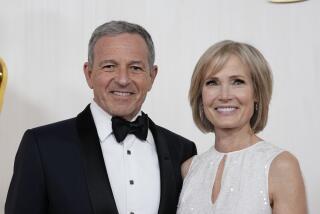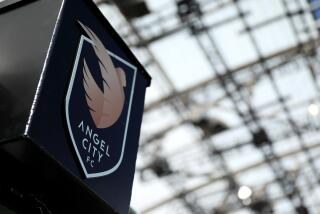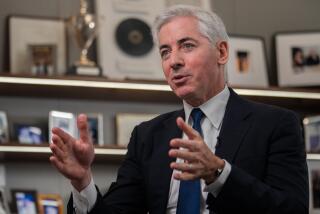Ackman, Valeant partner in bid to buy Botox maker Allergan
Activist investor Bill Ackman is partnering with a Canadian pharmaceutical company in an effort to buy Allergan Inc., the Irvine company that makes the popular wrinkle treatment Botox.
Ackman and Valeant Pharmaceuticals International Inc. have already acquired nearly 10% of Allergan’s shares and will soon offer to purchase the company, Ackman and Valeant said Monday in a regulatory filing.
News of the likely bid increased the stock price of both companies. In after-hours trading, investors drove up Allergan as much as 21% and Valeant by 10%.
No formal offer was made Monday, but there was speculation about how much Allergan could fetch.
The company’s stock closed Monday at $142 a share, giving it a market value of about $43 billion. But that was before the price shot up after markets closed. One analyst said Allergan would probably reject anything less than $54 billion to $57 billion.
Allergan had no comment on the potential takeover, said Cathy Taylor, a spokeswoman for the firm. The prospect of the deal was first reported by the Wall Street Journal.
In teaming with Ackman, Valeant may have found an aggressive partner it needs to acquire a reluctant target.
Ackman and his hedge fund, Pershing Square Capital Management, are well known for a long-running battle with Los Angeles nutritional products company Herbalife Ltd. He bought a huge stake in J.C. Penney Co., but sold all of his shares last year after a vocal but failed effort to change its leadership and direction.
If the Allergan deal goes through, Valeant would more than double in size, becoming one of the largest pharmaceutical companies in the world — and a giant in the eye and skin care business.
Allergan is a specialty pharmaceutical company, which makes most of its money from Botox but also sells breast implants and a line of ophthalmic drugs, including Restasis, the only prescription drug to treat chronic dry eye.
Valeant, which operates from headquarters in Laval, Quebec, bought Bausch & Lomb last year, making it a global leader in eye health products.
“We firmly believe that combining Valeant and Allergan would create an unrivaled platform for growth and value creation in healthcare, and we look forward to finalizing and announcing the terms of our proposal shortly,” Valeant said in a statement.
Ronny Gal, an analyst with Bernstein Research in New York, said he believes the deal could be bad news for Allergan’s 11,400 employees. Valeant’s business model has been to grow through acquisition, cut jobs and raise prices, he said.
Allergan spends about 17% of its revenue on research and development of new drugs — about $1 billion a year. Valeant allocates about 2% of its revenue to research and development, he said.
“I would expect a substantial reduction in employees if Allergan is going to be a division of Valeant,” Gal said. “If you’re working at Allergan, you’re going to be tossing and turning tonight.”
Valeant did not say how much it intends to offer for Allergan. One report said the company planned to offer about $45 billion in cash and stock — or about $150 a share.
“I will be very surprised if Allergan does not reject the offer,” Gal said. A buyout offer would “have to come closer to $180 or $190 [a share]. If it gets in that neighborhood, they’ll have to have a good reason they don’t accept.”
Allergan reported $6.3 billion in revenue last year, about $2 billion of that from Botox. Restasis, the dry-eye drug, generated about $940 million in revenue. The company made an additional $378 million from its breast-implant business and $100 million through sales of Latisse, a prescription drug that thickens eyelashes.
“What does Valeant see in Allergan? It sees excellent products,” Gal said.
Botox is particularly promising, he said. The Food and Drug Administration has approved the drug for a wide variety of uses, including the treatment of migraine headaches. And as the world’s economy improves, the drug’s cosmetic use is gaining popularity worldwide, Gal said.
Ackman did not respond to a request for comment. He has made headlines for more than a year in his highly publicized criticism of Herbalife.
In December 2012, Ackman said he had concluded after extensive research that Herbalife operates an illegal pyramid scheme and should be shut down by regulators. He said the company improperly pays its independent sales people more money for recruiting new sales people than for actually selling products. He bet $1 billion that the company’s stock price would fall.
The company denied those allegations, saying its model is legal and used by many other multi-level marketing firms. Spurred by Ackman, the Securities and Exchange Commission, Federal Trade Commission and FBI have opened investigations into Herbalife.
Allergan Chief Executive David E.I. Pyott will probably fight the acquisition effort unless the offer price is so high he can’t ignore it, Gal said.
“At the end of the day, you’re a steward of your shareholders’ money. If the offer is so high that you cannot with a clear conscience say it’s better for your shareholders to stay as it is, then you have to take the offer,” Gal said.
Twitter: @spfeifer22
More to Read
Inside the business of entertainment
The Wide Shot brings you news, analysis and insights on everything from streaming wars to production — and what it all means for the future.
You may occasionally receive promotional content from the Los Angeles Times.











